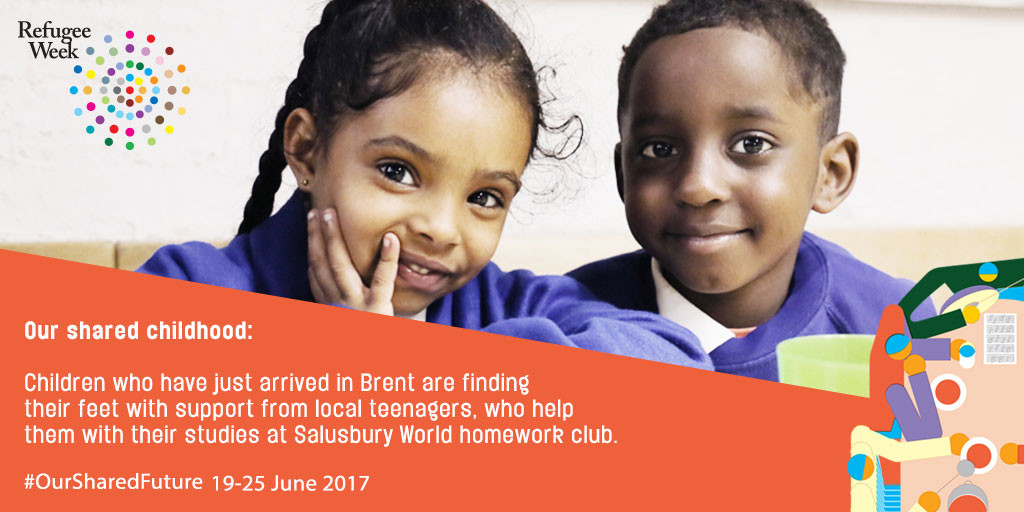As part of our #OurSharedFuture blog series, Marienna Pope-Weidemann talks to Sarah Reynolds, who runs a charity supporting refugee families to become active members of their new communities.
As a primary school teacher in east London for many years, it was her pupils that taught Sarah Reynolds about the labyrinth of barriers facing refugees in the UK. “Those children opened my eyes for life,” she says. “I developed a lifelong passion for working with pupils and parents to help them find their way.”
Sarah has now been coordinating Salusbury World for almost 14 years. The charity was founded by staff, governors and parents at Salusbury Primary School back in 1998. At that time, refugees from the war in Kosovo, Iraq and Afghanistan were being resettled in the area in growing numbers. “They were just being airlifted in and of course they wanted to get their children back into education as quickly as possible – so they’d just show up at the school,” she recalls. “It wasn’t just about school places: not speaking the language and coming into a climate of ignorance and often hostility, gaining access to housing and other services was all a struggle. The school wanted to help and collaborated to establish a charity right there on the premises.”
Salusbury World’s mission is to empower refugee children and families to become active members of their community. It delivers assemblies and training for teachers but most of its work is done locally, with the support of 120 volunteers. Now operating in three local secondary schools as well, Salusbury World runs a range of projects and after school clubs. Older students are supported to find work experience and help newly-arrived primary children find their feet through mentoring and the homework club. Other projects include a poetry collaboration with English PEN called Brave New Voices, which build the English writing confidence of refugee children, providing workshops and encouragement from published authors.
Part of a broader strategy to promote community integration, parents are also encouraged to get involved. They run the Spice Caravan, which caters for local events and sells samosas and donuts to the children once a week and act as guardians on excursions. Participating is often as meaningful for parents as it is for pupils. “It goes a long way towards helping people feel safe,” says Sarah. “Parents have said Salusbury World feels like family – and that’s exactly what we’re going for.”
Sarah maintains that diverse as the refugee community is, she constantly observes what she describes as “a deep and profound sense of dislocation and loss” leaving children with a distinct set of needs. “That’s not to undermine the struggles affecting many children and parents during this time of economic hardship,” she adds. “But by providing what’s needed for these children, on one hand we free up the resources of the school and of teachers to care for the whole class; and on the other we make sure that the experience of forced migration, something no child chooses, doesn’t cost them their childhoods or their chance to flourish.”
Fatimah Amer started volunteering for work experience and never left. “It’s amazing to see how your support makes a difference to them,” she says. “Seeing those recently arrived settle into their new environment, improve language skills and confidence, it’s such a privilege, you can’t help but be in awe of them. The work is incredibly fulfilling and humbling; you learn a lot about yourself and more from the children, perhaps, than they learn from us!”
Refugee Week is a big part of their awareness raising work. They take it as an opportunity to celebrate what refugee children bring to their school and this year, their focus is poetry on the theme of ‘home’. Performance poet Simon Mole will lead poetry workshops for the children and has created resources for use in other schools. “Poetry’s a very powerful way for children to communicate,” says Sarah. “The poet Sophie Herxheimer will also be working with pupils and parents on their personal stories. It’s an exercise where one person shares their story while the other listens and tries to draw it. It’s a very powerful thing, to be heard so completely and the listener creates something tangible from their perspective, something you can actually hold in your hands.”
After all these years, Sarah still marvels at the unique clarity with which children relate to deep issues. “They cut straight to the essence of things, straight to the point of what’s right and wrong, fair and unfair,” she explains. “They’re not so caught up in labels, either; it’s remarkable how easily they put themselves in the shoes of other children, wherever they’re from. And they know how to welcome, the power of a smile, of sharing their favourite toy. It’s humbling, really.” Sarah is also deeply impressed by how much even the youngest children understand about these issues and it gives her hope. “It’s a testament to the teachers and the power of education.”
After 18 years Salusbury World is still going – and growing – and for Sarah that is their greatest achievement. Sarah says she sees our shared future around her all the time. “It’s the most rewarding thing to see the children of families who you know have suffered so much, blossoming. We’ve got this one little girl, she’s eight years old. She’s so confident and sunny in this space, always showing her friends around and introducing us to them. The other day she came in while we were having a meeting about the holiday club, eight adults all sitting round the table. She came right up to sit with us and when I explained what we were doing she immediately started making contributions! To feel her voice is so valued here after all the trauma she’s been through… that speaks volumes about her as a person, the space we’ve created here and what kind of future is possible.”
